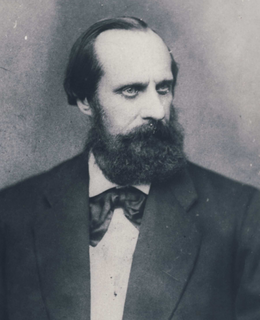 W
WIon Constantin Brătianu was one of the major political figures of 19th-century Romania. He was the son of Dincă Brătianu and the younger brother of Dimitrie, as well as the father of Ionel, Dinu, and Vintilă Brătianu. He also was the grandfather of poet Ion Pillat.
 W
WCarol I or Charles I of Romania, born Prince Karl of Hohenzollern-Sigmaringen, was the monarch of Romania from 1866 to his death in 1914, ruling as Prince (Domnitor) from 1866 to 1881, and as King from 1881 to 1914. He was elected Prince of the Romanian United Principalities on 20 April 1866 after the overthrow of Alexandru Ioan Cuza by a palace coup d'état. In May 1877, Romania was proclaimed an independent and sovereign nation. The defeat of the Ottoman Empire (1878) in the Russo-Turkish War secured Romanian independence, and he was proclaimed King on 26 March [O.S. 14 March] 1881. He was the first ruler of the Hohenzollern-Sigmaringen dynasty, which ruled the country until the proclamation of a socialist republic in 1947.
 W
WGheorghe Chițu was a Wallachian, later Romanian lawyer, politician, and man of letters, whose activities were mostly centered on the region of Oltenia. The recipient of a classical education, which compensated for his middle-class background and allowed him to study at the University of Vienna, he was also deeply involved in the Wallachian Revolution of 1848 as an early adherent of "Red" liberalism. He became a propagandist and organizer for the National Party, founding Vocea Oltului gazette in 1857. Chițu was confirmed as the United Principalities' first-ever elected provincial mayor, at Craiova, where he also worked as a lawyer and prosecutor. His political radicalism and his participation in the Romanian Freemasonry were nuanced by his defense of the Romanian Orthodox Church against a reduction of its assets. Serving for almost twenty years in the Assembly of Deputies and Senate, he criticized Westernization and championed local political models, including Oltenia's Tudor Vladimirescu. His parallel work as a publicist and publisher resulted in noted collaborations with Constantin D. Aricescu, Bogdan Petriceicu Hasdeu, and Theodor Aman; it also contributed to his being inducted into the Romanian Academy in 1879.
 W
WNicolae Fleva was a Wallachian, later Romanian politician, political journalist and lawyer. Known especially for his involvement in political incidents, and for a stated patriotism bordering on demagogy, he tested all political formulas that Romania's two-party system would allow. His activity in the public sphere brought a decades-long presence in the Assembly of Deputies and a mandate as Mayor of Bucharest between 1884 and 1886.
 W
WNicolae Grigorescu was one of the founders of modern Romanian painting.
 W
WMihail Kogălniceanu was a Romanian liberal statesman, lawyer, historian and publicist; he became Prime Minister of Romania on October 11, 1863, after the 1859 union of the Danubian Principalities under Domnitor Alexandru Ioan Cuza, and later served as Foreign Minister under Carol I. He was several times Interior Minister under Cuza and Carol. A polymath, Kogălniceanu was one of the most influential Romanian intellectuals of his generation. Siding with the moderate liberal current for most of his lifetime, he began his political career as a collaborator of Prince Mihail Sturdza, while serving as head of the Iași Theater and issuing several publications together with the poet Vasile Alecsandri and the activist Ion Ghica. After editing the highly influential magazine Dacia Literară and serving as a professor at Academia Mihăileană, Kogălniceanu came into conflict with the authorities over his Romantic nationalist inaugural speech of 1843. He was the ideologue of the abortive 1848 Moldavian revolution, authoring its main document, Dorințele partidei naționale din Moldova.
 W
WAlexandru Barbu Știrbei, also rendered Alex. Știrbeĭ, Știrbey, or Știrbeiŭ, was a Wallachian-born Romanian aristocrat, politician, businessman and agriculturalist, the son of Barbu Dimitrie Știrbei, Prince of Wallachia, younger brother of George Barbu Știrbei, and nephew of another Prince, Gheorghe Bibescu. After a short career in the French Army, he returned to the United Principalities and served terms in their Assembly of Deputies, inheriting the fortune left by his father. He established pioneering industries around his manorial estates of Buftea and Dărmănești, and became a guest, and sometime host, of literary meetings held by the political club Junimea.
 W
WGrigore Mihail Sturdza, first name also Grigorie or Grigori, last name also Sturza, Stourdza, Sturd̦a, and Stourza, was a Moldavian, later Romanian soldier, politician, and adventurer. He was the son of Prince Mihail Sturdza, and a scion of ancient boyardom, and, during the 1840s, an heir apparent to the Moldavian throne, for which he was known throughout his later life as Moldavia's Beizadea. A rebellious youth famous for his feats of strength, he set up his own private militia which he used to corner the Moldavian grain trade, and entered a legal battle with Sardinian retailers. In 1845, he defied his father, and French law, by seeking to marry the much older, already married Countess Dash, and barricaded himself with her at Perieni. By 1847, Grigore had been reintegrated into the Moldavian establishment, and, as a general in the Moldavian princely militia, personally handled repression during the attempted revolution of April 1848. During these events, the Beizadea became personal enemies with three future statesmen—Alexandru Ioan Cuza, Mihail Kogălniceanu, and Manolache Costache Epureanu.